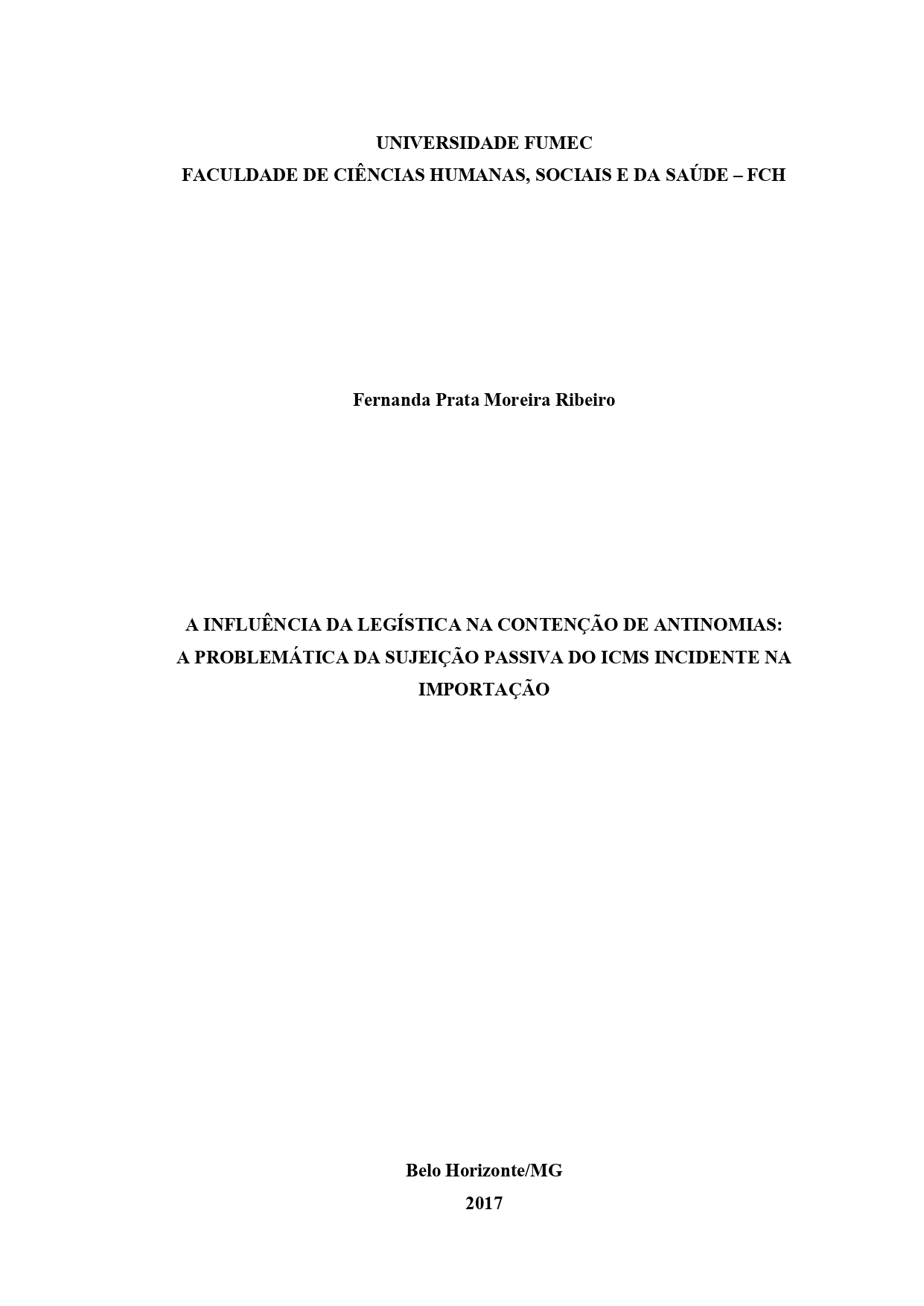A influência da legística na contenção de antinomias: a problemática da sujeição passiva do ICMS incidente na importação

Visualizar/
Data
2017Autor
Ribeiro, Fernanda Prata Moreira
xmlui.mirage2.itemSummaryView.MetaData
Mostrar registro completoResumo
A presente dissertação visa a demonstrar a ingerência da Legística na prevenção e correção de
antinomias legislativas, com o enfoque voltado para a incompatibilidade existente na
arrecadação do Imposto sobre a Circulação de Mercadorias e Serviços – ICMS – incidente nas
importações, na linha de pesquisa do Programa de Pós-graduação Stricto Sensu em Direito da
Universidade FUMEC. O artigo 155, parágrafo 2º, inciso IX, alínea “a” da Constituição da
República e a Súmula 660 do Supremo Tribunal Federal disciplinam a respeito de
mercadorias importadas, com a consequente exigência de ICMS. Todavia, tais instrumentos
normativos são antagônicos, de modo que, simultaneamente, um autoriza o recolhimento do
tributo e o outro revela a impossibilidade da cobrança àqueles que não são, naturalmente,
contribuintes do imposto. A organização processual legislativa e o harmônico diálogo
institucional promovido no Estado Democrático de Direito pelo Processo Constitucional
evidenciam os antecedentes do fenômeno do Constitucionalismo e permitem insculpir as
etapas elaborativas e os limites de alteração do texto da Constituição, de modo a fundamentar
a sua legitimidade. O aprofundamento do Direito Sumular caracteriza a consolidada
existência de atividade legiferante no âmbito do Judiciário, ainda que em desempenho de
função atípica, para que, então, seja delineado o debate perpetrado entre as normatizações em
comento. A Legística, amparada no estudo da Legisprudência, com o intuito de criar normas
de acentuada qualidade e com resultados eficazes, também atua na contenção das
inconsistências do ordenamento jurídico por meio da problematização e das avaliações,
prospectiva e retrospectiva, que sua teoria propõe. As conclusões são resultado da revisão
bibliográfica sobre as Teorias Processualistas, sustentadas por Oskar von Bülow, Elio
Fazzalari e André Cordeiro Leal, com ênfase à Teoria Constitucionalista, difundida por José
Alfredo de Oliveira Baracho, Ronaldo Brêtas de Carvalho Dias e Sérgio Henriques Zandona
Freitas. A pesquisa, de natureza compreensivo-dogmática, é complementada pelas teorias que
designam a Legística como procedimentalização metódica imprescindível à qualidade das
leis, idealizadas por Jeremy Bentham, Peter Noll e Gaetano Filangieri e disseminadas por
Fabiana de Menezes Soares, Luzius Mader e Jean-Daniel Delley. A análise de decisões, com
ênfase no tratamento jurisprudencial quanto à modificação do regramento constitucional e,
também, à edição e republicação do enunciado do Supremo Tribunal, demonstrará o equívoco
cometido com emenda constitucional promulgada. Justifica-se essa intervenção à medida que
a insegurança jurídica provocada por normas contraditórias regularmente válidas é situação
que não se coaduna ao ideal preconizado de inteligibilidade legislativa. This dissertation aims to demonstrate the Legistic’s interference in the prevention and
correction of legislative antinomies with focus on incompatibility in the existing collection of
Tax on the Circulation of Goods and Services - ICMS - incident on imports, in the research
line of the Stricto Sensu Post-graduation Program in Law at FUMEC University. The article
155, 2nd paragraph, item IX, subparagraph “a” of the Federative Republic of Brazil’s
Constitution and the Precedent 660 of the Federal Supreme Court discipline on imported good
with the consequent ICMS requirement. However, such normative instruments are
antagonistic, so that at the same time one authorizes the collection of the tax and the other
reveals the impossibility of recovery on those who are not, naturally, taxpayers. The
legislative procedural structuring and the harmonious institutional dialogue promoted between
the Democratic State of Law and the Constitutional Process evidence the antecedents of the
Constitutionalism phenomenon and allow to outline the elaborative stages and the change
limits of the Constitution text, in order to substantiate its legitimacy. The deepening of the
Precedent Law characterizes the consolidated existence of the legislative activity within the
scope of the Judiciary, even though in atypical function performance, so that, the debate
perpetrated between the norms in question is delineated. The Legistic, supported by the
Legisprudence study, with the intention of creating rules of high quality and with effective
results, also works in the containment of the inconsistencies of the legal system through the
problematization and evaluations, prospective and retrospective, that its theory proposes. The
conclusions are the result of the bibliographic review on the Processual Theories, supported
by Oskar von Bülow, Elio Fazzalari and Andre Cordeiro Leal, with emphasis on the
Constitutionalist Theory, spread by Jose Alfredo de Oliveira Baracho, Ronaldo Bretas de
Carvalho Dias and Sergio Henriques Zandona Freitas. The research, of a dogmatic and
comprehensive nature, is complemented by the theories that designate the Legistic as
methodological procedure indispensable to the quality of the laws, idealized by Jeremy
Bentham, Peter Noll and Gaetano Filangieri and disseminated by Fabiana de Menezes Soares,
Luzius Mader and Jean-Daniel Delley. The decisions’ analysis, with emphasis on the
jurisprudential treatment regarding the constitutional rule modification and, also, the edition
and republishing of the Supreme Court, will demonstrate the mistake committed with
constitutional amendment promulgated. This intervention is justified to the extent that the
legal uncertainty provoked by regularly valid contradictory rules is situation that does not
conform to the preconized ideal of legislative intelligibility.
